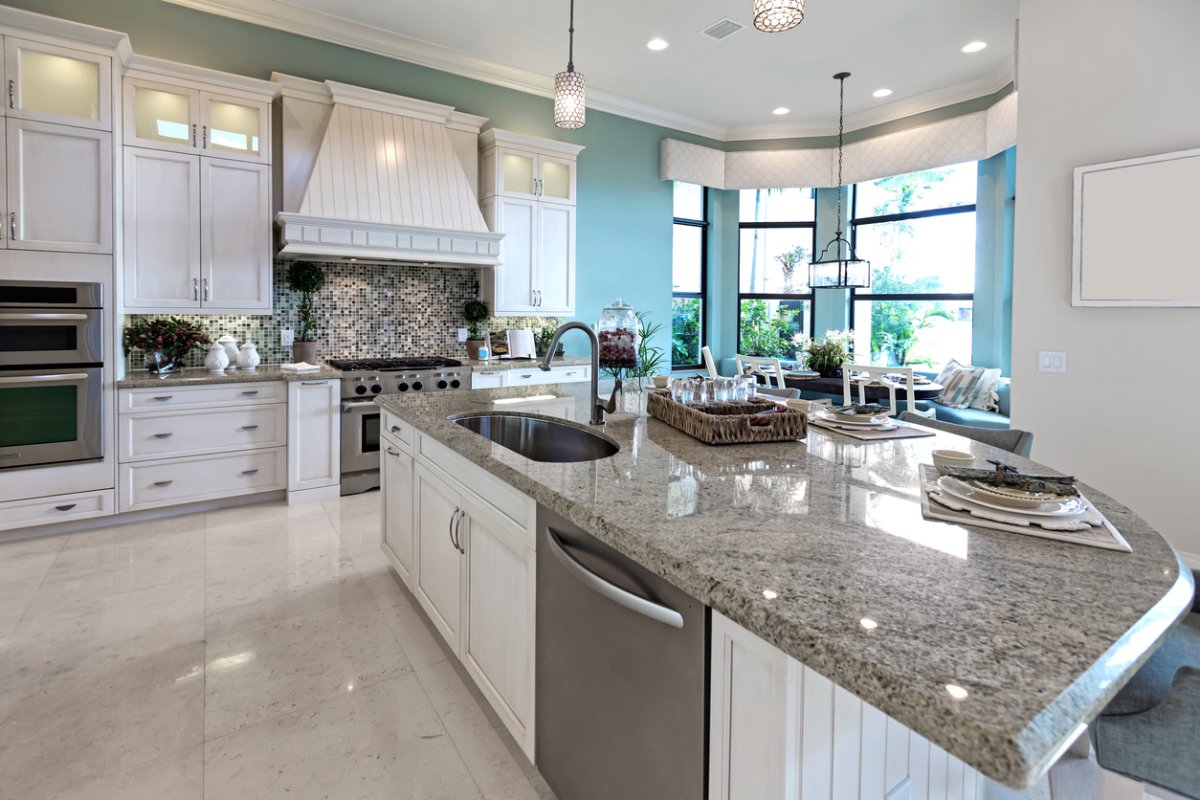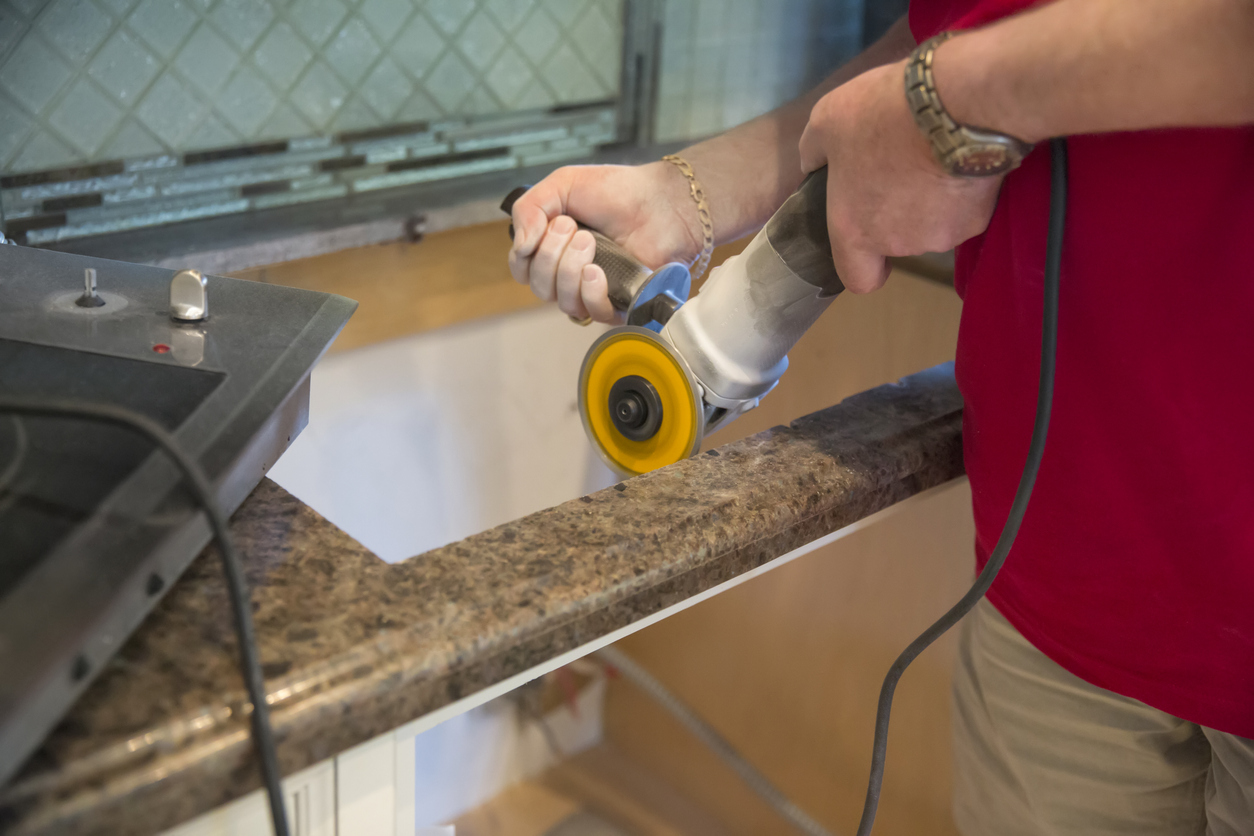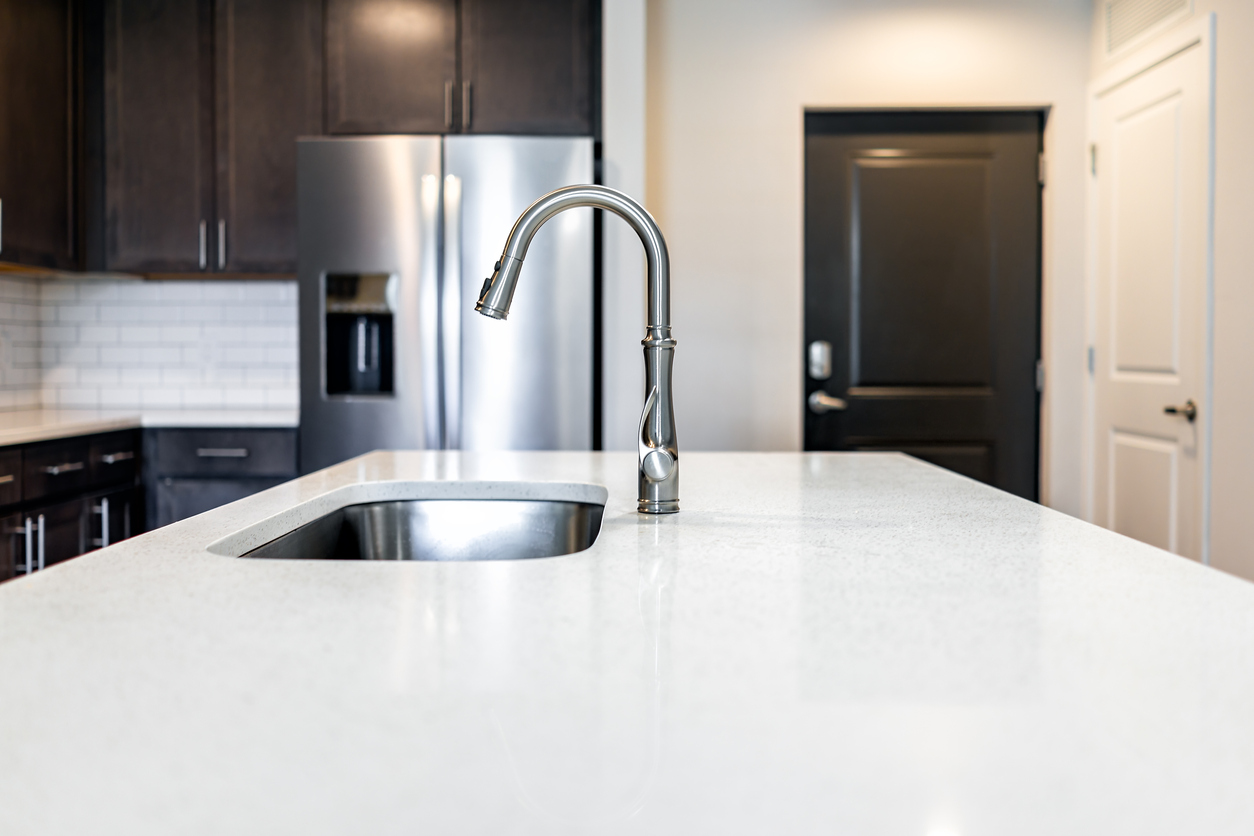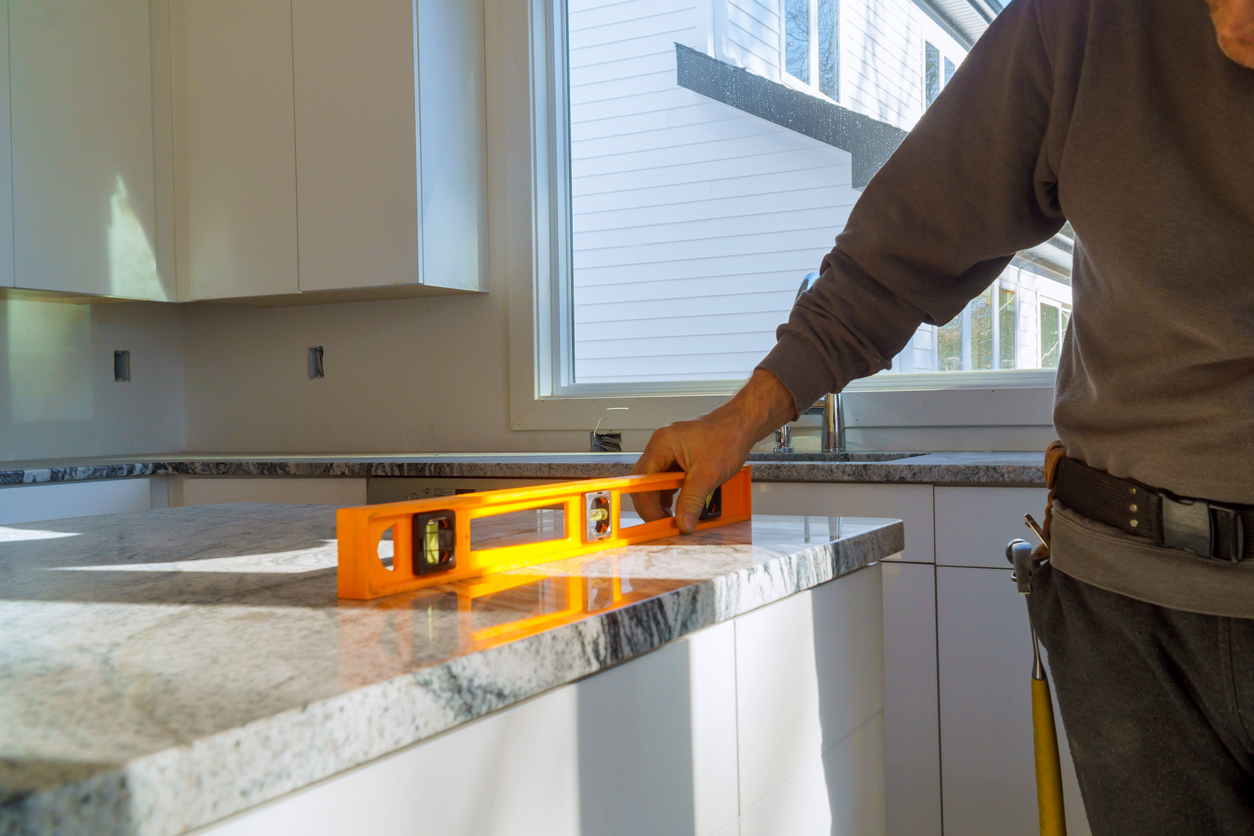

We may earn revenue from the products available on this page and participate in affiliate programs. Learn More ›
Whether a homeowner is planning a full-scale kitchen remodel or a quick face-lift, new countertops are often at the top of their wish list. There are many options when homeowners are selecting countertop materials, from the rustic and simple to the astonishingly expensive and luxurious, and the choice will depend on the kitchen style, the aesthetics of the home, trends in the geographic area, and budget. Two of the best countertop materials that meet many remodelers’ visions and budgets are granite and quartz: Both are available in a variety of styles and shades, are heat-resistant and relatively low maintenance, and have options that will fit into many budgets. Plus the natural-stone appeal and longevity of granite and quartz mean the counters will hold their value past short-term trends and increase the resale value of the home.
The fact that both materials are natural and fairly heat-resistant, however, is where the similarities end. Granite and quartz are quite different in appearance but also in maintenance, care, and cost. Choosing either will result in a beautiful kitchen, but homeowners will likely want to take the up-front cost of countertops and the long-term cost of maintenance into account when selecting either of these stone options for their countertops.
1. Granite countertops typically cost less than quartz to purchase and install.
Granite can be purchased in several ways: Customers can select a slab out of which their countertops will be fabricated or choose prefabricated counter sections. The average granite countertop cost is $15 to $140 per square foot for slabs and $10 to $35 per square foot for prefabricated pieces, averaging $3,250 per project nationally. Especially for the slabs, this is an enormous range, because each piece of granite is composed of flecks and chunks of different stone material, so the patterns, thickness, and strength will vary from slab to slab. The more unique and solid the piece is, the more expensive it will be. Slab pieces will also require cutting and finishing (though many prefabricated pieces will also require sink cutouts and edge finishing). Because the cost of granite countertops varies so widely, customers with smaller budgets can select pieces that are attractive and affordable, and customers with larger budgets can choose unusual and expensive pieces to complement their luxury kitchen plans. Some retailers will also market decomposed granite (a crushed-stone granite that adds texture to surfaces) for a different type of countertop, either to include in concrete countertops for visual interest or in DIY-style resin countertops, although those options aren’t really considered to be traditional granite countertops and have different properties and costs.

Quartz countertops are an engineered product crafted from 93 percent natural quartz stone combined with colors and resin. When shopping for countertop products, customers may wonder about the differences between quartz vs. quartzite; the term “quartz” always refers to this composite product, where the term “quartzite” refers to 100 percent natural stone—a beautiful, strong, and much more costly option. The average cost of quartz countertops is between $15 and $100 per square foot, with a national range of $1,500 to $12,000 total per project, averaging $4,500. While quartz is slightly more expensive than granite in general, the engineered nature of quartz makes it easier to choose a style and ensure that all of the countertop pieces will match in terms of color and pattern.
Many homeowners look for opportunities to DIY some of the installation to save money on a project. It’s important to note that neither of these materials is DIY-friendly. The weight, size, and tendency of stone to crack, plus the need to cut out sink openings and then finish the edges, make them much more suited to professional installation.
2. Although quartz countertops have a higher initial cost than granite, they are also more durable, which could justify the expense for some homeowners.
Quartz countertops are nonporous, which means that they don’t absorb the colors or odors of food or liquids that come in contact with the quartz. The material resists stains without the need for continuous resealing, and it is easy to clean. In addition, the combination of quartz stone dust and resin is exceptionally durable and resistant to cracking, chipping, or breaking. The most maintenance a customer might expect is to periodically check the seam where countertop pieces meet or where the counter meets the wall: It’s possible that the adhesive in the seam could degrade or loosen over long periods of time. In general, however, regularly cleaning the countertop is the only maintenance quartz countertops need. Therefore, while quartz countertops cost more at the outset, maintenance costs after installation will be minimal.

3. Granite countertops need to be sealed when installed and then on an ongoing basis, which adds to the cost. Quartz countertops do not require sealant.
In the past, granite countertops were installed with no natural or artificial sealant on the material, so they needed to be sealed monthly or more. Most granite is now coated prior to delivery with a sealant that has a little more staying power, so while the counter will need to be sealed immediately after installation, resealing is now an annual event rather than a monthly task. Still, the inconvenience and cost of sealing the counters, especially if the customer chooses to hire someone to do the job, add to the cost of the material over time. Failing to seal the granite regularly can lead to stains and discoloration from food and liquids—even water. Unsealed granite will not develop an attractive patina like a butcher-block or metal counter; instead it will stain and harbor bacteria. Quartz countertops, on the other hand, do not require sealing because the resin component of the engineered material naturally seals the otherwise porous stone.
4. Quartz countertops are more resistant to staining than granite countertops, which could mean fewer maintenance costs in the long term.
Even customers who regularly seal their granite countertops will likely experience some staining. Because of granite’s naturally flecked and patterned appearance, small stains that result from an area that didn’t absorb the sealant as well can perhaps be ignored, but larger stains may require polishing and grinding, then resealing and refinishing, which can add significantly to the cost of the granite over the life of the countertop.
The resin in quartz countertops makes the material much, much more stain-resistant. This is not to say that it’s impossible to stain a quartz countertop: Some acids or dyes are very aggressive and can stain almost any material (lemon juice that sits for an extended period of time and the very potent red dye in some drink mixes being chief offenders), but in general if the quartz countertop is promptly cleaned, it will remain stain-free and will not incur significant repair costs. The biggest threat to the appearance of a quartz countertop is direct sunlight, which can cause the material to fade or discolor over time. This is why quartz should be installed only as an indoor countertop and never in an outdoor kitchen that is open to the sun. In addition, while quartz is heat-resistant, placing extremely hot materials on the surface may cause the resin to warp or burn.
5. Granite is also more susceptible to cracking, and repairs or replacement will likely increase the overall cost.
Quartz counters are made from quartz pieces that are ground and mixed with resin to create a strong, durable bonded product. Granite is a beautiful, all-natural stone that develops over time in huge chunks and is then sourced, carefully cut into slabs of 2 to 3 inches, and then honed or finished. It is by nature more delicate, as the thin slab formation spreads the heavy weight of the stone over a large area. If the piece is handled professionally, the finishing, edging, and cutting of the slab will strengthen the material by providing strong supportive structure underneath, but the material is still vulnerable to cracking or breaking. This is why the cost to install granite countertops is generally higher than for other materials. Small cracks can be repaired by a skilled craftsperson at a cost, and then the counter will need to be polished and resealed. Large cracks or breaks may not be repairable, in which case the piece may need to be replaced. Because granite is densely patterned, the entire counter may need to be replaced if a slab that matches closely enough cannot be located. This may reduce the lifespan of the countertop significantly and essentially means replacing the entire countertop much sooner than planned.

6. Ultimately, homeowners will want to consider their personal tastes and preferences in addition to cost before selecting a countertop material.
Both granite and quartz make beautiful countertops that will complement almost any kitchen. The materials provide a range of colors, patterns, and styles, and both provide beauty and durability. Each has its own benefits: Granite is less expensive to install initially, is fabricated from all-natural materials, and comes in an enormous variety of natural and unique patterns and colorways, but it requires more maintenance overall and can crack or stain. Quartz does generally cost more initially, but it is virtually maintenance-free and very durable. It’s available in colors and patterns that are easier to match because the product is engineered, although some customers may prefer the natural granite product over the engineered quartz; the presence of resin can also cause some mild off-gassing (this is when a manufactured item releases volatile organic compounds [VOCs] or other chemicals into the atmosphere, which may have a negative health effect for the home’s residents).
Regardless of which product works best with the customer’s taste, style, and budget, choosing a professional for this project will result in the strongest installation without risk of injury to the installer or the material. Quality installation will also increase the appearance and lifespan of the product. With materials such as quartz and granite, which are fragile during transport but durable after installation, hiring a professional for the project is a good choice to make.
FAQs
Quartz and granite countertops add beauty and value to a home, bringing in a natural element that holds up well to the workings of a kitchen. Each has its strengths and weaknesses, but for most customers the decision between the two will come down to budget, appearance, and maintenance. There’s no clear winner, so remodelers and home builders can be confident that whichever product they choose will beautify their home—as long as they let a professional install it.
At the time of installation, yes, quartz is generally more expensive. The cost ranges do overlap, so there are certainly slabs of granite that will initially cost significantly more than a lower-grade quartz. However, the cost of maintenance on a granite countertop over time—regular sealing, crack repair, occasionally premature replacement—can make the overall cost of granite higher than expected.
It’s difficult to compare quality, because they’re really two different products. Both are natural stone, but while granite is a single slab of stone hewn from a larger vein of material, quartz is an engineered stone made primarily of quartz pieces and dust bound with resin. Each is beautiful and has properties that will appeal to homeowners for different reasons.
When homeowners are comparing granite or quartz vs. marble, customers will find that marble is the most expensive countertop material overall. Marble is more expensive and requires more maintenance than both quartz and granite, so those costs will also add to the higher initial outlay.
Stone countertops will last a long time. If the slab of granite is solid and has no inherent fault lines, then a granite countertop and a quartz countertop will have similar lifespans. However, part of the beauty of granite is in its striations, which often exist along faults, and quartz countertops simply don’t have those faults, so barring unusual damage, quartz will generally last longer than granite.
Perhaps. Quartz contains resin, which has a melting point. Lower-grade quartz may warp or melt if a hot pan is placed directly on the surface for more than a moment. Higher-grade quartz will have a higher melting point and may be safe unless the pan is extraordinarily hot. The resin burns that can occur are not repairable, so it’s best not to take the chance.
Those who are looking for a nonporous surface that is crack-resistant and low-maintenance will enjoy the properties quartz offers. While it’s a bit more expensive than granite at the outset, the longevity and low maintenance make it worth the investment for those who are less concerned about the natural slab patterns of granite.
Both materials are offered in a range of textures: polished, honed, sandblasted, and in some cases leather. Customers can choose the finish they prefer. The glossy polished finish of either stone will be shiny and deep, but as quartz is finished with resin, the polished surface will be perfectly smooth, while granite may retain some of its natural texture.
Both quartz and granite are considered luxury countertops, especially at the top end of their price ranges. They cost more than many other types of countertop but are not the most expensive options, either. The price range allows for customers with lower budgets to choose lower-grade quartz or more common granite patterns so they can have a more luxurious material without blowing the project budget, and it also allows customers with large budgets to choose rare and exceptionally beautiful materials, such as rose quartz or blue or black granite.
It does not. Quartz is among the most stain-resistant countertop materials available because of the resin incorporated into the product during manufacturing.
Quartz. Granite isn’t terribly high-maintenance, but it does need to be sealed regularly (from once per month to once per year, depending on the product) and is prone to staining when the sealant has worn away or not absorbed. Those stains require professional repair. Also, granite can crack along the natural faults inherent in the stone, at which point the crack may need to be repaired or the whole countertop may need to be replaced. Quartz requires almost no maintenance—regular cleaning and an occasional check of seams.
